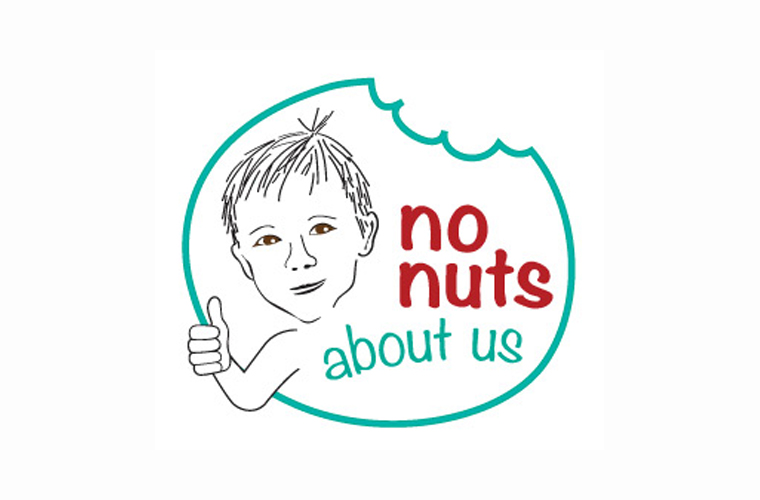Elly Ward, the owner and founder of No Nuts About Us, talks to Best Allergy Sites about food allergies, family life and starting her own allergy-friendly business.
Tell us about No Nuts About Us. What are your goals? What makes it different?
No Nuts About Us is one of a kind. It’s the only store in Canada, that sells a large variety of products that are geared to those with nut allergies. Not only are all of the items peanut and tree nut free, but all manufactures are contacted every six months to ensure that their facilities are peanut free and tree nut free.
Personal care items aren’t required to list priority allergens, so it can be difficult for people to find products that are from a completely nut free facility. No Nuts About Us only sells products I found that were not only free of the “common” tree nuts, but also tree nuts that many companies don’t consider to even be a tree nut, like shea.
Eventually, I hope No Nuts About Us will be a household name and the go-to place for nut allergic individuals and families. I hope to make shipping available to the United States as well so that nut allergic families there can take advantage of the complete nut free shoppe.
What made you decide to start No Nuts About Us?
No Nuts About Us was created to help families like ours source safe products. Living in a rural area, I was travelling to 4 or 5 different grocery and specialty stores as well as shopping at a few online stores to find safe products for my son. I also found that the majority of common nut-safe products, are not products I would choose for my family as they are full of artificial and chemical ingredients. I sourced out organic, GMO free and more natural foods and personal care items, which were hard to find. I figured there had to be a store somewhere in Canada that had a wide variety of products that were from nut free facilities, yet there wasn’t.
An online store allows me to reach all Canadians with a nut allergy.

Elly Ward, owner of No Nuts About Us
What is your personal experience with food allergies?
Growing up, my brother had several food allergies and he was lactose intolerant. He never had an Epipen (although maybe he should have), he received regular allergy shots, and he had asthma and used a puffer. Fast forward to when my first child was 8 months old. I thought I knew about food allergies. I didn’t.
I gave my son a tiny bit of peanut butter on a cracker when he was 8 months old and in under a minute, he had hives around his mouth, which quickly spread to his hands. I rushed him to the ER, which was about a 20-30 minute drive from our home. By the time we arrived at the ER, his arms and torso were covered in hives. Luckily the triage nurse knew what to do because she immediately rushed me right back to a room and a doctor was called. My son’s skin was lobster red from the waist up and he was upset. Being so young, he couldn’t tell us what was happening. He was hooked up to an oxygen and blood pressure monitor and the doctor gave him Benadryl. That didn’t help so they administered prednisone. Luckily, his symptoms resolved and we went home several hours later with a prescription for Epipens and were told to see our family doctor to refer him to an allergist.
Since that time, I’m constantly researching food allergies. I’ve read books, sourced information in medical journals, spoke to several allergists, visited many allergy foundation websites, researched new treatments, and so much more. There is always something new to learn.
How has living with food allergies changed your lifestyle?
Living with food allergies changed so many things for our family. We immediately removed all peanut products from our home and have been seeing an allergist annually since our son turned one. Obviously, changing what we buy is significant. We don’t order in as often and we don’t go out to eat, except at select places. My husband and I will occasionally go to a restaurant that we wouldn’t deem safe for our son, but only when our children at staying at Grandma’s for the night. We still won’t eat anything with peanut. For us, the risk is just too great and no food is more important than our son’s safety.
A major change is the increase in anxiety and stress. I tend to get very anxious when we are out and I try my very hardest not to impose that fear onto my son.
A more recent change has been the enrollment of our son in the phase III peanut patch trial when he was four years old. He is now in the rollover study and is guaranteed to receive three years of treatment on the actual peanut patch. We are hoping that this trial will increase his tolerance to peanuts. Although he will not be “cured” of his peanut allergy, this may help with cross contamination risk in the future.
What do you feel is the biggest barrier that people living with food allergies face?
I feel that the largest barrier to the food allergic community is education. Education is so important, and reaches to all facets of our lives. Every area of our lives is affected by food allergies and it’s hard to break the stigma of what people believe food allergies really are. So many don’t understand how severe food allergies can be, what can cause a reaction, why food labeling isn’t what it could be….the ignorance can manifest into such hate, especially on social media. What happened to the saying “it takes a village”? What happened to compassion for others?
Schools, recreation centres, workplaces, parents, friends, neighbours, food manufacturers, restaurants, and more can affect the every day lives of those living with food allergies. I don’t think that they realize how much of a difference they can make just taking a moment to ask a question and really listen to the answer. What a difference they could make by answering a question with honestly and empathy instead of with legalese, annoyance and hate.
Any advice for aspiring entrepreneurs?
So many times, I think people think of what could go wrong instead of what could go right. I do that all the time, I self-doubt. It’s not going to be easy, but if you have a great idea, do something about it. Find a mentor, visit your local small business association, apply for programs and grants to help you get started.





COMMENTS